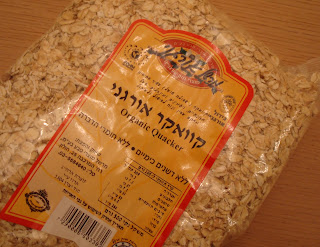 It is a well-known custom among North American Jews to seek out special little enclaves at Christmas. Those without the rare luck of being invited (as my brother and sister-in-law apparently were) to a "Jews, Losers and Boozers" party resort to the more traditional fallback, Chinese food and a movie, preferably, for those who are really devout, one by Woody Allen. (The latest, starring Larry David, is just out in theaters here, by the way). But a North American Jew in Israel feels obligated to fulfill the opposite task: to find a dash of Christmas cheer in a landscape bereft of goyishe-naches.
It is a well-known custom among North American Jews to seek out special little enclaves at Christmas. Those without the rare luck of being invited (as my brother and sister-in-law apparently were) to a "Jews, Losers and Boozers" party resort to the more traditional fallback, Chinese food and a movie, preferably, for those who are really devout, one by Woody Allen. (The latest, starring Larry David, is just out in theaters here, by the way). But a North American Jew in Israel feels obligated to fulfill the opposite task: to find a dash of Christmas cheer in a landscape bereft of goyishe-naches. 
The direct train from Tel Aviv to Haifa that I boarded yesterday evening was packed, but not one of my fellow passengers was rushing home for Christmas Eve. Just your average weekend. I was leaning against the back of a seat watching two Ethiopian kids on the floor munching noisily on Bamba, and, on either side of them, exhausted young soldiers with heavy packs filled (I think it's safe to assume) not with stocking stuffers but with dirty laundry to unload on mothers anxiously awaiting their return. One poor kid had konked out so heavily on his gear that he didn't even hear the Ricky Martin ringtone blasting directly into his ear. Another dozed off quietly with Amos Oz's "To Love a Woman" rising and falling rhythmically on his chest. A far cry from the macho image of the Israeli military one finds in the media.
I arrived in Haifa just in time for my mom to serve me a plate of piping hot meatballs and a side of red cabbage (where's the Christmas roast?!) before scurrying out the door to a doctor's appointment. No sipping eggnog by the fireplace, no ring-jing-jingling sleigh bells, no presents under the fragrant tree. Just a little pleasure-reading before retiring early to bed. I must admit, I missed the lights and the kitsch just a teensy-weensy bit.

Today was different. How nice it was to spend a REGULAR lazy Friday here. I had a haircut in the morning, and, on the way home, went with my dad to pick up some nuts in Vadi Nisnas. It seemed quieter than usual. And that's when we realized: Christmas! Of course! This is the Arab Christian part of town. Besides one baklava shop and the spot where we picked up our goods, all the shops and restaurants were shut for the holidays, their unlit windows adorned with mismatched nativity scenes and acrobatic Santa Clauses. At last, the kitsch I'd been longing for! Even the bagel shop was closed. If only someone could explain to me why a place that advertises "bagelakh" (yes, in Yiddish), is owned by Arabs who are spending the day celebrating the birth of baby Jesus.... Well , Jesus may have been born here, but he sure feels a long way away today.

This is one of the first Christmases I've spent not feeling like a minority (and not freezing my ass off!). That's exciting on both counts. But I'm still going to search for Bing Crosby on youtube later. Gotta hear "White Christmas" at least once this time of year. It wouldn't feel right not to.






 g, Haim Zhitlovsky, Sholem Asch, and I.L Peretz, the big machers appearing from left to right) got together in the cultural capital of the former Austrian Bukovina to proclaim Yiddish "a national language of the Jews." This year's centennial was only 15 months behind... not bad for Jewish time! Lectures were offered in Yiddish and in Hebrew, with frequent funny fusion moments during the Q&A, which was really just a function of the seniority of the more vocal audience members. (I think it's safe to assume that most of them have been lingering in a kind of linguistic limbo for the past 80+ years.) Topics ranged from Soviet Yiddish travel literature of the interwar period to Elie Wiesel's unknown career in Yiddish journalism to the history of Yiddish lexicography to teaching Yiddish to children in the 21st century. In short, a gantse megile!
g, Haim Zhitlovsky, Sholem Asch, and I.L Peretz, the big machers appearing from left to right) got together in the cultural capital of the former Austrian Bukovina to proclaim Yiddish "a national language of the Jews." This year's centennial was only 15 months behind... not bad for Jewish time! Lectures were offered in Yiddish and in Hebrew, with frequent funny fusion moments during the Q&A, which was really just a function of the seniority of the more vocal audience members. (I think it's safe to assume that most of them have been lingering in a kind of linguistic limbo for the past 80+ years.) Topics ranged from Soviet Yiddish travel literature of the interwar period to Elie Wiesel's unknown career in Yiddish journalism to the history of Yiddish lexicography to teaching Yiddish to children in the 21st century. In short, a gantse megile! 


















